最新人教版新目标 初二英语八年级下册Unit9 Have you ever been to a museum检测题及参考答案
- 格式:doc
- 大小:214.50 KB
- 文档页数:9

Unit 9 have you ever been to a museum?复习题I.重点词组默写1.科学博物馆___________________________2.游乐场________________________________3.去某个不同的地方 _____________________4.乘地铁 _______________________________5.玩得高兴,过得愉快____________________6.去滑冰 _______________________________7.导致,引导 ___________________________8.搭起帐篷 _____________________________9.以如此快的方式 _______________________10.下象棋 _______________________________11.许多不同种类的…______________________12.鼓励某人做某事 _______________________13.泡一杯茶 _____________________________14.像…一样享受 _________________________15.几次 _________________________________16.特别的主题____________________________17.在公园里走动__________________________18.一次乘舟行程 _________________________19.搭乘;兜风 _________________________20.举行派对,聚会________________________(单数 have a party)21.做笔记 _______________________________22.成千上万的,许许多多的 _______________23.度假 _________________________________24.一方面…,另一方面…______________________________________25.四分之三______________________________26.一个讲英语的国家______________________27.做某事有困难__________________________28.似乎很奇怪____________________________29.最佳时间做某事________________________30.在一个自然环境中 _____________________31.全年,整年 ____________________________32.接近,靠近,在附近 ____________________33.在白天 ________________________________34.在东南亚_______________________________35.介意做某事 ____________________________II. Grammar Focus 默写1.你曾经去过科学博物馆吗?______ you_____ ______ to a science museum?是的,我曾经去过自然博物馆。
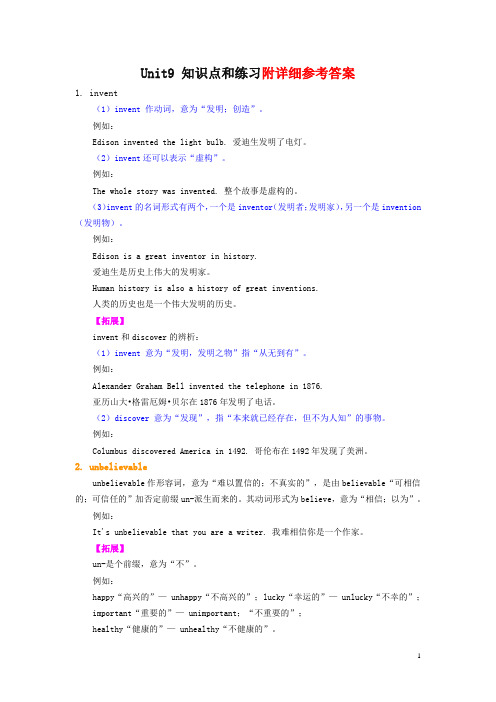
Unit9 知识点和练习附详细参考答案1. invent(1)invent 作动词,意为“发明;创造”。
例如:Edison invented the light bulb. 爱迪生发明了电灯。
(2)invent还可以表示“虚构”。
例如:The whole story was invented. 整个故事是虚构的。
(3)invent的名词形式有两个,一个是inventor(发明者;发明家),另一个是invention (发明物)。
例如:Edison is a great inventor in history.爱迪生是历史上伟大的发明家。
Human history is also a history of great inventions.人类的历史也是一个伟大发明的历史。
【拓展】invent和discover的辨析:(1)invent 意为“发明,发明之物”指“从无到有”。
例如:Alexander Graham Bell invented the telephone in 1876.亚历山大•格雷厄姆•贝尔在1876年发明了电话。
(2)discover 意为“发现”,指“本来就已经存在,但不为人知”的事物。
例如:Columbus discovered America in 1492. 哥伦布在1492年发现了美洲。
2. unbelievableunbelievable作形容词,意为“难以置信的;不真实的”,是由believable“可相信的;可信任的”加否定前缀un-派生而来的。
其动词形式为believe,意为“相信;以为”。
例如:It's unbelievable that you are a writer. 我难相信你是一个作家。
【拓展】un-是个前缀,意为“不”。
例如:happy“高兴的”— unhappy“不高兴的”;lucky“幸运的”— unlucky“不幸的”;important“重要的”— unimportant;“不重要的”;healthy“健康的”— unhealthy“不健康的”。
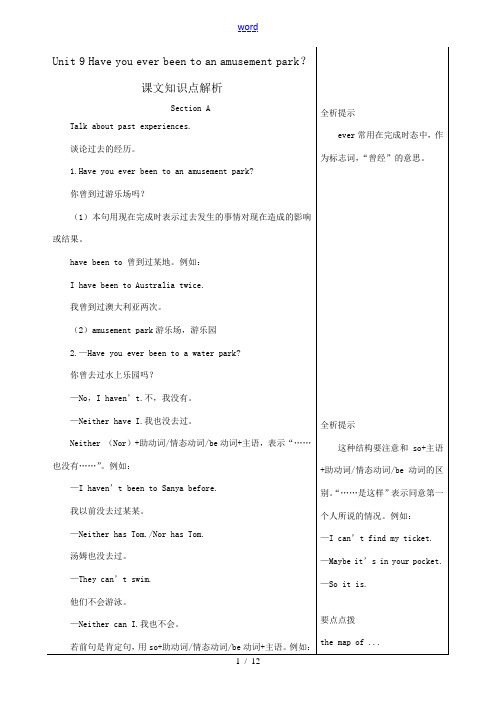

人教新目标版八年级下册Unit9 Have you ever been to a museum?单元练习一、听力(听力)(共20小题;共20分)I. 听句子,选择正确答语。
1. A. I'm afraid you can't. B. That's great. C. It doesn't matter.2. A. Good idea. B. At 7 o'clock. C. Not at all.3. A. No, please do it.B. Yes, you can do it.C. It's very kind of you.4. A. She is better now.B. She likes dancing.C. She is tall and pretty.5. A. Since last month. B. September. C. Six o'clock.II. 听对话,选择正确答案。
6. How long has he stayed in China?A. Two weeks.B. A week.C. A month.7. What is she going to be?A. An English teacher.B. A tour guide.C. A math teacher.8. Who has ever been to a water park?A. Sarah.B. Ben.C. Tina.9. How many English-speaking countries has she been to?A. Three.B. Four.C. Five.10. How long did the film last?A. An hour and a half.B. Two hours.C. 150 minutes.III. 听对话,选择正确答案。
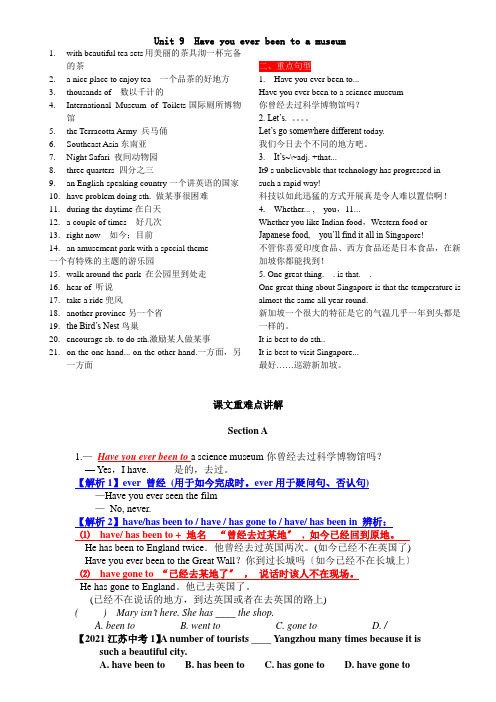
Unit 9 Have you ever been to a museum 1.with beautiful tea sets用美丽的茶具沏一杯完备的茶2. a nice place to enjoy tea 一个品茶的好地方3.thousands of 数以千计的4.International Museum of Toilets国际厕所博物馆5.the Terracotta Army 兵马俑6.Southeast Asia东南亚7.Night Safari 夜间动物园8.three quarters 四分之三9.an English-speaking country一个讲英语的国家10.have problem doing sth. 做某事很困难11.during the daytime在白天12. a couple of times 好几次13.right now 如今;目前14.an amusement park with a special theme一个有特殊的主题的游乐园15.walk around the park 在公园里到处走16.hear of 听说17.take a ride兜风18.another province另一个省19.the Bird’s Nest鸟巢20.encourage sb. to do sth.激励某人做某事21.on the one hand... on the other hand.一方面,另一方面1. Have you ever been to...Have you ever been to a science museum你曾经去过科学博物馆吗?2. Let’s. 。
Let’s go somewhere different today.我们今日去个不同的地方吧。
3. It’s~\~adj. +that...It9 s unbelievable that technology has progressed in such a rapid way!科技以如此迅猛的方式开展真是令人难以置信啊!4. Whether... , you,11...Whether you like Indian food,Western food or Japanese food, you’ll find it all in Sin gapore!不管你喜爱印度食品、西方食品还是日本食品,在新加坡你都能找到!5. One great thing. . is that. .One great thing about Singapore is that the temperature is almost the same all year round.新加坡一个很大的特征是它的气温几乎一年到头都是一样的。

Unit 9 Have You Ever Been to an Amusement Park?一、学习目标:1.掌握现在完成时的用法;2.了解一般过去时、现在完成时和现在完成进行时的意义的区别;3.能够准确使用多种时态谈论自己的经历。
二、学习重点难点:1. 现在完成时由主语+have/has+过去分词构成。
其主要用法如下:I.在未指明具体时间的情况下,现在完成时动词通常可以表示在说话之前已经完成,而后果或影响至今仍存在的动作。
例如:The concert has started. 音乐会已经开始。
I have had breakfast. 我已吃过早饭。
注意:have gone to 和have been to 在意义上有区别。
例如:He has gone to Hong Kong. 他到某某去了。
(他已前往某某,或在途中,或已到达。
说话人暗示他现在不在现场。
)He has been to Hong Kong. 他曾到过某某。
(说话人认为他过去到过某某,现在已不在该地。
言外之意他对某某有所了解。
)II. 现在完成时动词可以表示开始于过去持续到现在(也许还会继续进行下去)的动作或状态。
例如:1) I have studied English since last year. 我从去年开始学习英语。
2) She has lived in Beijing for five years. 她住在已经五年了。
注意:e, go , leave, arrive, buy, lose, receive, join, die, bury 和marry 等动词所表示的动作是一时的,不能延续的,故不能与for …,since …等开头的表示一段时间的状语连用。
不过,这些词用于否定句则可以与表示持续的时间状语连用,即动作的不发生是可以持续的。
例如:不能说:*He has e to Beijing for two years.*He has bought that book for three weeks.*He has joined the Army for one and a half years.*His grandma has died for nine months.* I have received his letter for a month.可以说:He has been in Beijing for two years.He has had that book for three weeks.He has been in the army for one and a half years.His grandma has been dead for nine months.I haven't received his letter for almost a month.或者:It is two years since he came to Beijing.It is three weeks since he bought that book.It is one and a half years since he joined the Army.It is nine months since his grandma died.2. 现在完成时把过去的动作和现在的结果联系起来,一般过去时只限于表示过去的动作本身,与现在的结果无关。

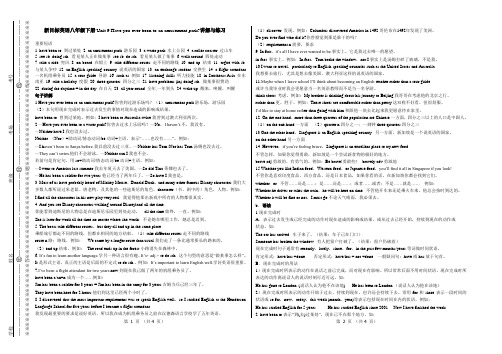
第 1 页 (共4 页) 第 2 页 (共4 页)学校 姓名 班级 考场 考号---------------------------------○密------------------ -------------------○封----------------------------- -- --○线----------------------------※※※※※※※※※※※※※※※答※※※※※※※※※※※※※※※※※※题※※※※※※※※※※※※※※※※线※※※※※※※※※※※※※新目标英语八年级下册Unit 9 Have you ever been to an amusement park?讲解与练习重要短语1. have been to 到过某处2. an amusement park 游乐园3. a water park 水上公园4. a roller coaster 过山车5. see sb. doing sth. 看见某人正在做某事 see sb. do sth. 看见某人做了某事6. walk around 四处走动7. take a ride 兜风 8. on board 在船上 9. take different routes 走不同的路线 10. end up 结束 11. argue with sb. 与某人争吵 12. an English-speaking country 说英语的国家 13. an exchange student 交换生 14. a flight attendant 一名机组乘务员 15. a tour guide 导游 16. such as 例如 17. listening skills 听力技能 18. in Southeast Asia 在东南亚 19. take a holiday 度假 20. three quarters 四分之三 21. have problems (in) doing sth. 做某事很费劲 22. during the daytime = in the day 在白天 23. all year round 全年,一年到头 24. wake up 醒来,唤醒,叫醒 句子讲解1.Have you ever been to an amusement park?你曾到过游乐场吗?(1)amusement park 游乐场,游乐园 (2)本句用现在完成时表示过去发生的事情对现在造成的影响或结果。

Unit 9 Have you ever been to a museum?Section A(1a-2d)知识点一have/has been to去过某地Have you ever been to a science museum?你曾经去过自然博物馆吗?have/has been to意为“曾经去过某地”,但现在已不在那里了。
I have never been to Kunming before.我以前从没去过昆明。
My father has been to Hong Kong many times.我爸爸去过香港很多次。
1.have/has gone to意为“去了某地”,说话时该人不在现场,主语为第三人称。
—May I speak to Mr.Smith?——我可以和史密斯先生通电话吗?—Sorry,he has gone to China.——抱歉,他去英国了。
2.have been in意为“在某地”,表示在某地待了多少时间,常与表示一段时间的状语连用。
They have been in New York for five weeks.他们在纽约五周了。
知识点二反意疑问句It’s really interesting,isn’t it?它真的很有趣,不是吗?这是一个反意疑问句。
反意疑问句是由“陈述句 +附加疑问句”构成,遵循“前肯后否,前否后肯”原则。
此问句可用yes或no来回答。
附加反意疑问部分的主语要用代词,并与陈述部分主语一致,谓语动词在人称、数和时态上也要与陈述部分一致。
Linda won the speaking competition,didn’t she?琳达赢了演讲比赛,是吗?【温馨提示】1.含有never,hardly,seldom等的句子为否定句,反问部分用肯定形式。
2.反义疑问句的回答要“据实回答”,即事实是肯定的,就做肯定回答;事实是否定的,就做否定回答。
—Mary comes from England,doesn’t she?——玛丽来自英国,是吗?—No,she doesn’t.She is from the UAS.——不,不是。

Unit 9 Have you ever been to an amusement park ?68页1.amusement [ u ] 娱乐、消遣an amusement park 游乐场Have you ever been to an amusement park? 你曾经去过一个游乐场吗?Fun Times Amusement Park 欢乐时光游乐场。
复习have been to 去过,回来了have gone to 去了,现在不在这里have been in 去了,还在那里2. neither① adj. pron 二者都不Neither answer is correctNeither of the answers is / are correct.Which do you like? Neither I think they’re both ugly.② adv. 也不I don’t know. Me neither. I don’t know, either.70页3. Disneyland 迪斯尼乐园(前无冠词)Have you ever been to Disneyland?In fact, there are now several different Disneyland amusement parks around the world. 事实上,现在世界上有好几处不同的迪斯尼游乐场。
around the world = all over the worldacross China = all over China4. Mickey Mouse 米老鼠5. Donald Duck 唐老鸭6. character①性格I know his character very well.②汉字Chinese characters③人物、角色famous characters from Chinese historyDisney characters 迪斯尼人物Mickey Mouse and Donald Duck are famous Disney characters.7. seen see的过去分词。
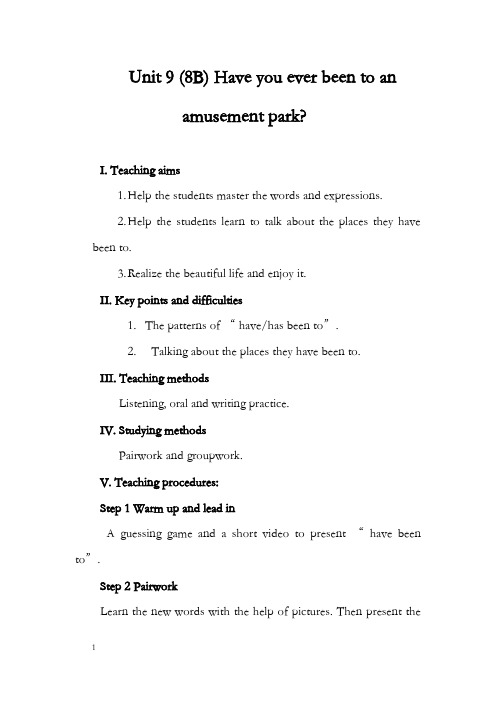
Unit 9 (8B) Have you ever been to anamusement park?I. Teaching aims1.Help the students master the words and expressions.2.Help the students learn to talk about the places they havebeen to.3.Realize the beautiful life and enjoy it.II. Key points and difficulties1.The patterns of “ have/has been to”.2.Talking about the places they have been to.III. Teaching methodsListening, oral and writing practice.IV. Studying methodsPairwork and groupwork.V. Teaching procedures:Step 1 Warm up and lead inA guessing game and a short video to present “have been to”.Step 2 PairworkLearn the new words with the help of pictures. Then present thenew dialogue and have the students practice the dialogue.Step 3 1b listen and find out what places they have been to.Step 4 Game(magic eyes)Show the photos of some places quickly, have the students tell the answers quickyly. It is to practice “He/She has been to…”Step 5 2a Listening. Listen and circle the places they hear.Step 6 2b ListeningStep 7 GroupworkWork in groups of four. Take turns to ask their partners. The others answer the questions as quickly as you can.Step 8 SummaryAsk the students to summarize what we learned. (words and expressions)Step 9 Surveyone of their friends and write the report.their passages in class.Step 10 HomeworkWrite about one of their own trips by using what they have learned.Enjoy traveling!Survey one of your friends and try to write your report.1.Do you like going out on vacation ?Very much A little Not at all2.How often do you go out to have fun?Usually Often Sometimes Never 3.Where have you been?_______________________________4.When did you go to …?_______________________________5.Where are you going next vacation?_______________________________6.How are you going there?Other ways ___________7. (other questions you want to know)…Report: My good friend … likes …. She/He…。

Unit 9知识点梳理和单元复习附参考答案1. 单元重点短语归纳:2. Have you ever been to a science museum? 你曾经去过科学博物馆吗?【重点】【辨析】have/has been to;have / has gone to ;have/ has been in;(1). have/ has been to 表示“某人曾经去过某地”强调现在已经回来了,不在那里了。
E.g.: We have been to Qingdao. 我们去过青岛。
(现在不在青岛)(2). have gone to表示“某人到某地去了”,强调现在还没有回来,可能在那里或途中。
E.g.: They have gone to Sydney. 他们去悉尼了。
(现在在悉尼或途中)(3). have been in +地点:表示“某人在某地待了很长时间”,常与时间段搭配。
E.g.: I have been in Nanchang for three years. 我在南昌待了3年了。
How long have you been in China? 你在中国待了多长时间?3. 一般过去时与现在完成时的用法比较【重点】&【难点】(1). 一般过去时表示过去某个时间发生的事、存在的状态或经常发生的动作。
说话的侧重点只是陈述一件过去的事情,不强调对现在产生的影响。
E.g.: He visited Guilin in 1998. 在1998年他参观过桂林。
(只说明去桂林的时间)(2). 现在完成时表示动作发生在过去,对现在造成了影响或产生了结果。
不能与确定的过去时间状语连用。
E.g.: Jill has bought a new computer. 吉尔买了一台新电脑。
I have taught here for fifteen years. 我在这儿教学已经15年了。
I have seen the film. 我看过这部电影。

八年级英语(下)第九单元检测题 (10)班级_____ 姓名_______________ 学号________ 等级_______一、根据句意和首字母提示完成单词。
1. Have you ever b___________ to a museum?2. They have p___________ seen the movie. It’s so interesting.3. I hope that they will have a w______________ time in the amusement park.4. In the last twenty years great c_____________ have taken place in Linyi.5. I d_____________ that the most exciting thing in the holiday is traveling.6. After she g___________ from the university, she became a flight a_________.7. He has been a tour g______________ for a lot of years.8. Chinese students are interested in European c_________________.9. Many people , e_____________ young people like American movies.二、用所给的正确形式填空。
1. He ___________ ever ___________ (be) to the History Museum several times.2. —_______________ you ever _____________ (be) to the zoo?—Yes. I ________ (go) there last summer. I _______ (see) many kinds of animals there.3. —Where is Mr. Wang?—He _________ (go) to the library. He wants to borrow some library books.4. Rodgers ______ (plant) those trees. He _______ (do) it the day before yesterday.5. We ______ (learn) English for more than two years.6. When he ____________(finish) his work, he ____________(ring) me up.三、按要求变换下列句型。

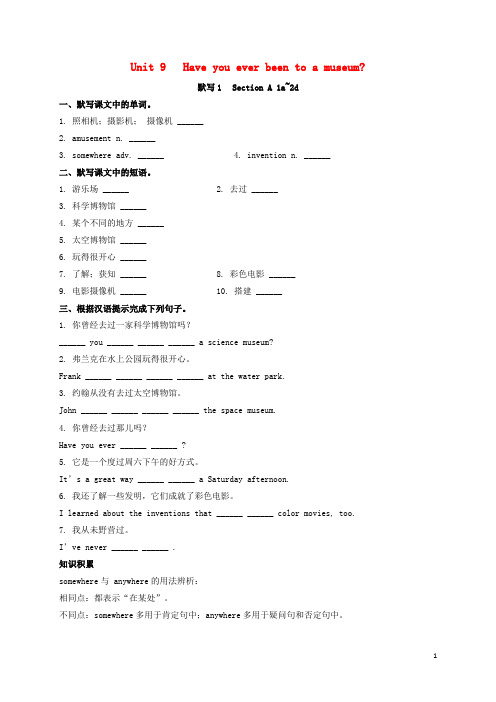
Unit 9 Have you ever been to a museum?默写1 Section A 1a~2d一、默写课文中的单词。
1. 照相机;摄影机;摄像机 ______2. amusement n. ______3. somewhere adv. ______4. invention n. ______二、默写课文中的短语。
1. 游乐场 ______2. 去过 ______3. 科学博物馆 ______4. 某个不同的地方 ______5. 太空博物馆 ______6. 玩得很开心 ______7. 了解;获知 ______ 8. 彩色电影 ______9. 电影摄像机 ______ 10. 搭建 ______三、根据汉语提示完成下列句子。
1. 你曾经去过一家科学博物馆吗?______ you ______ ______ ______ a science museum?2. 弗兰克在水上公园玩得很开心。
Frank ______ ______ ______ ______ at the water park.3. 约翰从没有去过太空博物馆。
John ______ ______ ______ ______ the space museum.4. 你曾经去过那儿吗?Have you ever ______ ______ ?5. 它是一个度过周六下午的好方式。
It’s a great way ______ ______ a Saturday afternoon.6. 我还了解一些发明,它们成就了彩色电影。
I learned about the inventions that ______ ______ color movies, too.7. 我从未野营过。
I’ve never ______ ______ .知识积累somewhere与 anywhere的用法辨析:相同点:都表示“在某处”。
不同点:somewhere多用于肯定句中;anywhere多用于疑问句和否定句中。

人教新目标八年级英语下册 Unit 9 Have you ever been to a museum教学设计一. 教材分析人教新目标八年级英语下册Unit 9 “Have you ever been to a museum?”主要讨论了人们参观博物馆、公园等地方的经历。
通过本节课的学习,学生可以掌握一般过去时的用法,学会如何用英语描述自己或他人的经历。
本节课的主要语言点是一般过去时的疑问句、否定句和一般疑问句的构成,以及常用的动词短语。
二. 学情分析八年级的学生已经掌握了英语学习的基本语法和词汇,具备一定的听、说、读、写的能力。
但是,对于一般过去时的用法和如何用英语描述经历还需要进一步的引导和练习。
因此,在教学过程中,需要注重激发学生的兴趣,通过各种教学活动帮助他们理解和掌握语言点。
三. 教学目标1.知识目标:学生能够掌握一般过去时的疑问句、否定句和一般疑问句的构成,学会如何用英语描述自己或他人的经历。
2.能力目标:学生能够听、说、读、写一般过去时的句子,提高运用英语进行交际的能力。
3.情感目标:通过讨论参观经历,培养学生对文化、历史等领域的兴趣,拓宽视野。
四. 教学重难点1.重点:一般过去时的疑问句、否定句和一般疑问句的构成。
2.难点:如何用英语描述自己或他人的经历,以及一般过去时的运用。
五. 教学方法采用任务型教学法,通过各种任务活动让学生在实践中学习和使用英语。
同时,运用情境教学法,创设真实的语境,帮助学生理解和掌握语言点。
此外,还采用分组合作学习的方式,提高学生的团队合作能力。
六. 教学准备1.教师准备:准备好相关的教学材料,如PPT、图片、卡片等。
2.学生准备:提前让学生预习本节课的内容,了解一般过去时的用法。
七. 教学过程1.导入(5分钟)通过展示一些博物馆、公园等地方的图片,引导学生谈论自己参观的经历,激发学生的兴趣。
2.呈现(10分钟)教师通过PPT展示一般过去时的疑问句、否定句和一般疑问句的构成,以及常用的动词短语。
人教版八年级下册英语Unit9同步检测题及参考答案卷I(共75分)听力部分(第一节)I. 听句子,选出句子中所包含的信息。
(共5小题,每小题1分,计5分)()1. A. fire B. fear C. fair()2. A. 2013 B. 2003 C. 1993()3. A. hundreds of B. because of C. thousands of()4. A. Tina and Jim have been to the naturemuseum.B. Tina has been to the nature museum but Jimhasn’t.C. Neither of Tina and Jim has been to thenature museum.()5. A. People in Singapore like English very much.B. People in Singapore speak English.C. Singapore is a beautiful country.II. 听句子,选出该句的最佳答语。
(共5小题,每小题1分,计5分)()6. A. Happy New Year. B. Have a good time.C. The same to you.()7. A. Me, neither. B. Oh, great. C. Me, too.()8. A. It’s great. B. By subway. C. Good idea.()9. A. It’s wonderful. B. No, never.C. By bus.()10. A. OK. B. It’s a good place.C. I hope so.III. 听对话和问题,选择正确答案。
(共5小题,每小题1分,计5分)()13. A. His father. B. His mother. C. His brother.()14. A. Last week. B. Last month. C. Last year.()15. A. It’s the name of a swimming pool.B. It’s a water park.C. It’s a museum.IV. 听短文和问题,选择正确答案。
(共5小题,每小题2分,计10分)()16. How did the speaker go to there?A. By car.B. By bus.C. On foot.()17. Where did they have lunch?A. Near the zoo.B. Near an amusement park.C. Near a water park.()18. Where is Jenny from?A. America.B. England.C. Australia.()19. What did Jenny do in her free time?A. Went to the cinema.B. Went shopping.C. Visited places of interest.()20. Why did Jenny like Wanda Cinema?A. Because it had the most interesting movies.B. Because it had the biggest screen.C. Because it had the friendliest service笔试部分V. 单项选择(共20小题,每小题1分,计20分)选出可以填入空白处的最佳选项。
()21. Disneyland is ________ amusement park. All the children like to visit it.A. aB. anC. theD. /()22. The question ______ is very easy. Everyone can answer it.A. itB. itsC. itselfD. it’s()23. It is an amazing and _______ experience to travel on the lonely island.A. usualB. unusualC. luckyD. unlucky()24. I’m from _______, the second largest country in Asia.A. AmericaB. ChinaC. EnglandD. India()25. _______ tourists visit the Great Wall during the summer holiday.A. Two thousandsB. Thousands ofC. Two thousand ofD. Thousand of()26. It’s much ______ to go across the road when the traffic light is green.A. safeB. dangerousC. more dangerousD. safer()27. My parents like to go _______ to enjoy theirholiday.A. peaceful somewhereB. somewhere peacefulC. anywhere peacefulD. peaceful anywhere()28. —Tom has been in America for many years,_______?—Yes, he has stayed there since he wasyoung.A. has heB. hasn’t heC. does heD. doesn’t he()29. Sally likes watching her kids ______ soccer on the playground when she is free.A. playingB. to playC. playD. played()30. —What a pity! I haven’t been to the SpaceMuseum.—_________.A. I haven’t, tooB. Me, tooC. Good ideaD. Me, neither()31. I’m afraid I have problems _______ what you said. Please speak slowly.A. to understandB. understandingC. understandD. understood()32. _________ you like pop music, rock music or country music, you’ll find it all in the shop.A. WheneverB. WhetherC. WhateverD. Wherever()33. My English teacher always encourages us ________ more English books.A. not readingB. not readC. readingD. to read()34. Two-thirds of the population in the USA _________ overweight now.A. isB. areC. wasD. were()35. I _______ my homework already. I ______ it last night.A. do; didB. have done; didC. have done; doD. will do; did()36. —Would you like something else _______?—No, thanks. I’m full.A. eatenB. ateC. eatingD. to eat()37. Please listen to the teachers as_______ as you can.A. carefullyB. carefulC. more carefullyD. more careful()38. —Where is Mr. Green?—He _______ to Sanya for a trip. Though he______ there twice, he still likes there verymuch.A. has gone; wentB. has gone; has beenC. went; has beenD. has been, has gone()39. There are so many good books in the store. I can’t decide ______.A. where to buyB. which to buyC. how to buyD. when to buy()40. Could you tell me ________?A. when will they leave BeijingB. when would they leave BeijingC. when they will leave BeijingD. when did they leave BeijingVI. 完形填空(共10小题,每小题1分,计10分)阅读下面短文,掌握其大意,然后从各小题所给的四个选项中,选出最佳选项。
★★New York is one of the most exciting cities in the world.You may want to do some 41 in New York. Fifth Avenue is New York’s most famous shoppin g street. But if you go there, be ready for “window shop”42 , because this is shopping for the rich. There are some less 43 shopping areas, and you can go to those famous 44 such as Bloomingdales, Macy’s and FAO Schwartz.And if you have 45 your roller skates, then you must pay a visit to Central Park. This is a large, open park 46 the middle of Manhattan. But you’ll be wrong if you think that people come here to 47 and get away 48 the busy city life. 49 sits in Central Park. Usually they run, jog (慢跑) and most of them skate.When you leave New York, you might be 50 but you won’t be bored!( )41. A. reading B. cleaningC. shoppingD. studying( )42. A. only B. either C. too D. already( )43. A. cheap B. expensiveC. specialD. crowded( )44. A. libraries B. restaurantsC. hotelsD. stores( )45. A. sold B. borrowedC. broughtD. made( )46. A. at B. in C. of D. to( )47. A. rest B. study C. work D. eat( )48. A. from B. of C. out D. with( )49. A. Somebody B. AnyoneC. NobodyD. Everyone( )50. A. nervous B. tired C. sad D. worriedVII. 阅读理解(共10小题,每小题2分,计20分)阅读A、B两篇材料,然后从各小题所给的选项中选出最佳选项。